Text
Announcing the first Arcadia game!

It’s been a little while since we first talked about Arcadia, but here is a little something - an update about what the first game will be.
Right now, it’s just going to be a simple one. The Star Sailors novella, which is what a number of our games is based off of, will serve as the source of inspiration for this unnamed game. The main character in the novella, Opus, is taking on the persona, or life-form of the force Gravity. A simple 1-player game, taking place on Kepler 22 (like in the novel) where you have to dodge the attacks that Gravity throws at you and defeat him.
Yes, it’s simple. Right now, it’s just a 500px by 500px screen with two characters and it’s pretty easy to win. But we’re making it on multiple versions, using Unity, Buildbox, Pygame & Javascript and we’re experimenting with what will work best on Pi-based Arcade systems and also on web-based game systems.
We’ll be expanding the game and making it into a mini-game in Arcadia (the way that mini-games will work is that you can earn the in-game currency by completing missions and mini-games, as well as achievments. It’s not meant to be a fully-featured game, but it will be large and expansive nonetheless).
Arcadia will also have citizen science applications like in Eve Online.
Keep up to date with our Stellarios development at https://acord.software/stellarios
1 note
·
View note
Photo










Prints from the 2019 season with Willo
0 notes
Photo





After the COVID-19 pandemic started to infect large numbers of the population, the decision was made to “temporarily” call a halt to proceedings for major sporting leagues around the world, including the AFL (Australian Football League), A-League (Australian Soccer League), and the EPL (English Premier League).
For someone like myself, this was devastating. Sport has played such a big role in my life for so many years, and I’m not the only one who was/is sad that the major sporting codes have taken a break. Now, on a Friday or Saturday evening, we don’t know what to do with ourselves; the stable source of entertainment, joy and at times sadness was no longer an option.
What was worse, for me, was that it also meant that I could no longer play sports. Even at school. I endured 5 weeks of lockdown, away from my trainers and friends, and when I kicked a football for the first time last Wednesday, I was shocked at how much my skills had disappeared. Over the next few days, after maniacal, repetitive kicking drills after dinner, my skills slowly began to return, but what didn’t was the games themselves.
When I heard that the league would be restarting in mid-June (just over a month away), I was on the oval at school. It was 3.15pm. I jumped up and started screaming. Since I’d last had training on the 12th of March, I’d barely seen any of my mates from the team. There had been one round of AFL before that, too, closed down; I decided that if our league would be opening this early then the AFL - the premier league in Australia - would surely follow suit, which gave me great anticipation for the weeks to come.
It was never going to be easy, after having the preseason that we did, to be able to just flick a switch and suddenly we’d have the free-flowing, run-and-carry football that won us two finals and a third-place finish. With Trent’s decision on whether to remain a blue or to go to the Falcons hanging over us, we should have done some more recruiting and attempted to search for players to poach from other clubs (I planned to mainly target Coolbinia, because I had a good relationship with some of their players, and due to the unfair monopoly that they had over the other teams in the division). But we had three or four weeks of training with scarcely any inclination that Trent was planning to leave. Then, I rocked up to training and I told him how glad I was that he had come back, and he said to me
You’re not going to like what I have to tell you....I’ve gone to Coolbinia. The deal’s done, it’s finished.
Regardless of the circumstances in which he left the club, Trent Fleming was an absolute jet for us and this was the reason why I pushed so hard to try and keep him. He tackled hard, he never shied away from any contest, and he was a top bloke. But he felt that the mutterings about the events pre-grand final last year were going to have a negative impact on his new family and the team as a whole, and he quit. A few weeks later, training ended and suddenly we had lost a player.
This was not to say that we had not picked up anyone in the off-season. Three or four new recruits, including Elijah Gardi (who seems to be versatile enough to play in any part of the field), did help to dampen the blow of losing Trent, but then we found out that Zac Broxton was leaving as well to go to CBC. And with the details around Tyson’s senior contract still to be finalized, we could face on of the major problems that we did last year - having no bench.
0 notes
Text
A Django Games library for AC0/RD

After purchasing a Zenva Academy Membership, I've been starting to follow the Space Invaders Tutorial. I'll be logging my progress here. Currently I've completed the firing and cooldown mechanics. I also sent through a thread on tribe.acord.software, however this thread will be kept up to date.
Liam Arbuckle (AC0/RD Forums)
One of my main projects at the moment is a games library that will be incoporated into the Stellarios software suite. The idea behind this games library is that, like other sites like agame.com & friv.com, there will be a selection of games that users can play, however we’re taking it one step - or rather, a few steps further than that.
One of the single biggest projects in the suite is our game Star Sailors (development name Manacaster), based on a novella series I’ve been writing on and off over the past few years. One of the reasons for its importance to us is the large amount of citizen science integration that will be inserted into SS. But it’s also big for another reason.
Social networking
One of our key selling points is our emphasis on community and connections. While social networking sites, like Facebook, have had privacy issues, we believe at ACORD that the invention of these networks has been not only one of the greatest innovations in recent history, it has helped forge connections, friendships, and collaboration. Some of the biggest philanthrophic projects have been organised through social media platforms, the Egyptian coup in 2011 was akin to the collapse of the Romanian communist party (what TV and radio did in the 20th century, internet is doing repeatedly in the 21st century) and was largely organised by members of one of the most popular social networks in existence, Twitter.
The introduction of Github has also seen open-source projects (like ours) thrive, with millions of developers and enthusiasts alike banding together to collaborate on projects and software, to improve and to innovate, not just invent. The social networking features of Github (which are only going to improve with the introduction of Github Discussions, which is something that we’ll be incoporating into our forums) have certainly helped with this, with both users of software and developers around the world being able to describe issues that they’re having, and anyone can help them out.
Having seen the impact that these platforms have had, we’ve had an ambition to develop our own social networking service ourselves. But ours is, and will be, much more ambitious than any other social website. Because it won’t just be connecting you with other developers at AC0/RD, and users of our software; it will also be connecting with your other social media profiles (Disqus, Github, Reddit, Facebook, etc) to create a truly unique experience, that works for you and connects you with each of our services (including our games, citizen science, etc).
Your user profile will connect you with others based on your interests, like on popular social networking platforms. But one of the advantages (similar to https://walls.io) is that you can connect it directly to your other accounts, with posts being able to be shared across every platform with just the click of a button.
Websites that have numerous games embedded on them are nothing new. However, what we’re doing is “gamifying” our entire network, and this games library that we’re creating with Django, Python & Unity is at the core of it. Easily earn credits by playing our games, and unlock more games, features and enjoyment. Everything is 100% free, and open-source, and we’re also recreating classic arcade games with our own unique Pixel Art.
We hope you enjoy it
Links:
1. Forum post: https://forums.acord.software/d/3-space-invaders-game-in-unity
2. Contributing code through discussion: https://blog.acord.software/post/612260427615928320/contributing-code-through-discussion
3. AC0/RD Network Digest: https://blog.acord.software/post/611947364722360320/ac0rd-digest-our-network-ambitions
4. HTML Dashboards: https://blog.acord.software/post/611809431430283264/html-dashboards-for-administration
#django#acord#games library#software#python#space invaders#arcade games#arcade#gaming#recreating games
1 note
·
View note
Text
Welcome to AC0/RD’s newest member, Basanta Kandel!
After sending in his application to us in January via our Facebook page, the board of AC0/RD unanimously voted to accept Basanta into our community after he started contributing to our html projects on github.
1 note
·
View note
Text
#GitChallenge - Github vs Gitlab comprehensive comparison
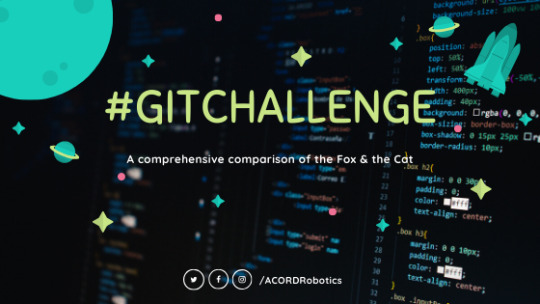
Recenty, Github announced that they were slashing prices for their premium plans and making a number of other features free due to the current Coronavirus pandemic. Gitlab have also made a similar announcement and, as I’ve used both Github & Gitlab in the past, I’d like to talk about the differences between the two powerhouses when it comes to version control.
What I currently use
Right now, I have accounts (as well as organisations for AC0/RD Software) with both Github & Gitlab, however I primarily use Github today.
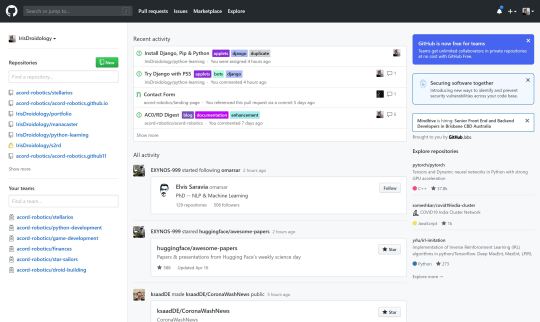
(My Github dashboard)
I use Github, because while Gitlab has more features, right now I don’t currently need to use CI/CD pipelines, and I get by fine with Github. Also, while Gitlab has made some great leaps and bounds with its UI over the past few years, for me Github is still better looking and that is the main reason that I use Github right now.
I only started using Github properly in 2019, but one of the old arguments against Gitlab was that no-one used it. After Microsoft shelled out $7.5 BILLION in 2018 for Github, developers jumped ship to Gitlab amid fears that Microsoft would “kill” the open-source community - however, both Github & Gitlab are thriving today.
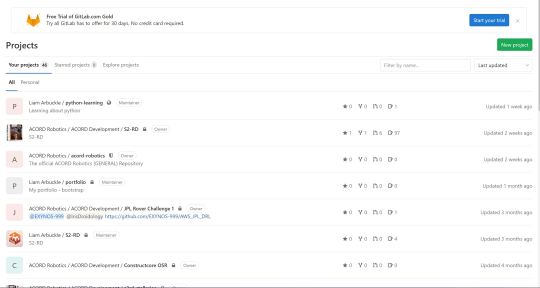
(My Gitlab dashboard)
Right now, I use Github for
Hosting my personal website through Github pages
Hosting the AC0/RD Software network
Learning & logging my progress with coding languages like C++, Java, and Lua
Sharing my simple Python & Unity projects
Occasionally using pipelines for my projects
I almost never need to use pipelines (Gitlab) or packages (Github), and while I’d like to in the future (in fact, once AC0/RD launches my usage of Git services will definitely be shifting to more “dev-oriented” usage), right now I have no need to. I still use Gitlab to host some repositories, but sparingly - usually for either a backup, or when I do need to use CI/CD tools.
Some simple differences
Now that we’ve got my reasons for using Github out of the way, let’s look at the differences between Gitlab & Github. There’s a few simple ones that confused me at first when I started using Gitlab after a few months on Github, but after a few days they confused me no more.
Repositories (on Github) are called Projects on Gitlab
Organisations are called Groups on Gitlab (and you can have subgroups, something I’ll talk about later)
Pull requests are called Merge requests on Gitlab
Comments on issues are counted as commits on Gitlab, but not on Github
Early history of the Fox & the Cat
After being founded in 2008 by Chris Wanstrath, P. J. Hyett, Tom Preston-Werner, and Scott Chacon, grew fast - reaching over 100,000 users in 2009 and a valuation of $750 billion in 2012.
Gitlab was founded 3 years after Github, in 2011, however the domain name had first been registered in 2004, and in 2010 the domain name was registered again and parked by GoDaddy. Unlike Github, from the start Gitlab understood the importance of CI/CD tools, and from the start it had a CI/CD applet - Github wouldn’t get one until 2019.
300 people signed up for the first beta of Gitlab, in 2012, and by 2016 it had over 100,000 organisations, or groups, and many millions of users - the fox was starting to gain on the cat’s momentum.
Repository membership
It wasn’t until April 14 this year that Github allowed teams, or organisations, to create unlimited private repostories. Gitlab had offered this to organisations from the start. While users on Github could host private repositories for free, Gitlab’s more versatile starter plan paved the way for less restrictions when it came to privacy.
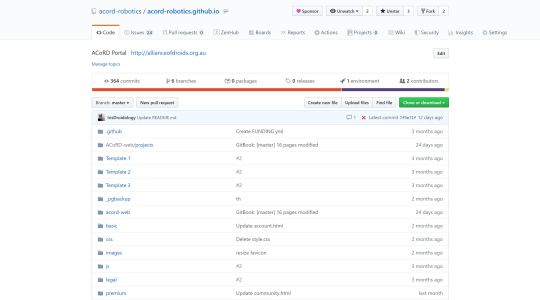
The repository for AC0/RD’s website
The layout across the Github website is horizontal, while Gitlab moved from that traditional layout (which I preferred) to a vertical sidebar:
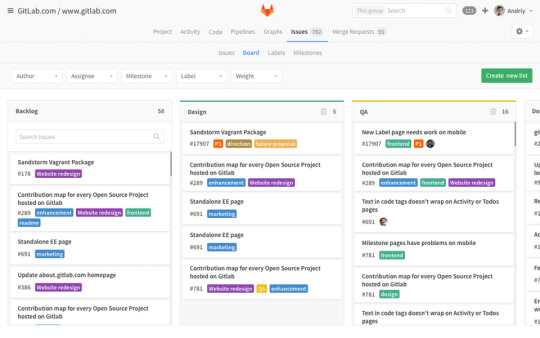
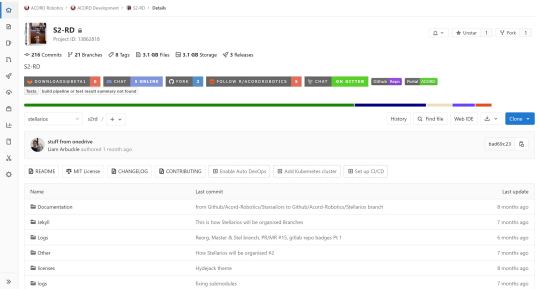
CI/CD Frameworks
This was one of the main reasons that developers jumped ship from Github to Gitlab, even before Microsoft’s big (and controversial) purchase of the Cat. Companies like CircleCI, Shippable & Jenkins are all examples of companies that grew big by accomodating the users who still used Github who required continuous integration. While last year Github introduced CI/CD for the first time, many people still use those services, for the main reason that since the Github team dragged their feet for so long, companies like Gitlab & CircleCI had made their platforms really, really good - so even a behemoth like Microsoft couldn’t recuperate all those customers from the start (give it time, however, and I believe that Github users will start to trust in the platform more, which in turn will give Github - and Microsoft - an incentive to improve the system).
Development & DevOps
One of the key problems with Github is that there is no webIDE - unlike on Gitlab (however, Gitlab does have its own problems with online usage - like only being able to upload a single file on the website at a time, but if you use a git client like GitKraken there’s no problem).
Here’s a comparison of DevOps between Github and Gitlab, from Gitlab’s website:

However, while Gitlab does release frequent updates each month, it’s not uncommon for users to complain about the new features that are added being rushed and only half-completed. Similarly, the common consensus around the UI/UX of the two platforms is that Github “features a super-simple interface and infrastructure.”
Community & Education
It’s a common argument amongst Github fans (and I’m one of them) that Github is a better platform because of its larger userbase, and that is true. Github has over 40 million users, making it the world’s largest website for open-source developers. While Gitlab certainly has a large number of developers & enthusiasts, too, it lacks the sheer number of well-built, official integrations that Github posesses - Trello, Slack & Monday.com are good examples of this.
But this is not to say that there are no external tools/integrations that work with Gitlab. Integromat & Zapier both support Gitlab, and there are slack & trello apps both available as well. If there’s an app that isn’t available on Gitlab, you can either build it yourself or get someone else to build it for you - chances are, there’s more people that feel the same way.
Or you can do what I did, and use both Github & Gitlab, but use something called “repository mirroring”. What this does is it allows you to connect a Github & Gitlab repository together, so if you need a specific feature from Github tbut your main repo is on Gitlab, it’s all good. The commits, pull/merge requests & issues can all be synced as well, either through the official interface of through third-party tools like Integromat.
The biggest downside for me with Gitlab is the lack of an education plan. While Gitlab does offer free premium plans to students, a school itself has to apply for one, and where I live - Australia - very few governments or schools see the importance or value in teaching coding or computer science, and they’re unlikely to put much time into investing in improving the experience of the few students who take computer science (which is still not yet a compulsory course!).
On the other hand, with Github I just input my education email addres and not only did I get access to Github premium, I also got access to premium plans for dozens of other websites and apps, like Canva & Name.com.
Choose what works best for you. Both solutions are great.
Liam
1 note
·
View note
Photo

Literally the best gaming room I have ever seen.
71 notes
·
View notes
Photo

Beautiful sunset outside my home
Taken on February 7, original photo here: https://www.instagram.com/p/B8Q439Wl6B-/
Taken on my Samsung S10e (2019)
1 note
·
View note
Text
The 2019/20 Open Source Rover Challenge wraps up today
And it’s been an absolutely massive and fun journey. Over the last two months, I’ve collaborated with three of the greatest people I could have imagined. My team has trained an RL-Agent to travel along the surface of Mars, picking up rewards as it goes, and we’ve helped contribute to the continuing development of the OSR project by NASA. I’d like to say thanks to Edwin, Rishabh & Mikhail, and I hope we get a chance to compete in many more challenges together.
#open source rover#space challenge#spacechallenge.tech#writing#coding#open source#nasa#jpl#open source nasa#nasa open source#jet propulsion#coding challenges#open source competitions#coding competitions#python programming#machine learning#machine learning programming#machine learning challenges#machine learning competitions#mars rover#open source space missions
1 note
·
View note
Text
Contributing code through discussion

Humans are social animals. The biggest and best projects that we have built are collaborative efforts, where borders and differences between us are ignored. In fact, the differing skills and knowledge of each member of a team are embraced and, in fact, diversity in skills and personal experience is important.
The same is true for coding projects. Documentation is incredibly important for projects, as it allows us all to be on the same page and understand what’s going on, regardless of skills or knowledge. But writing documentation can be boring and tedious, so here’s a method (or a few) that AC0/RD is in the middle of developing and implementing to encourage collaboration, documentation, bug fixing and code creation.
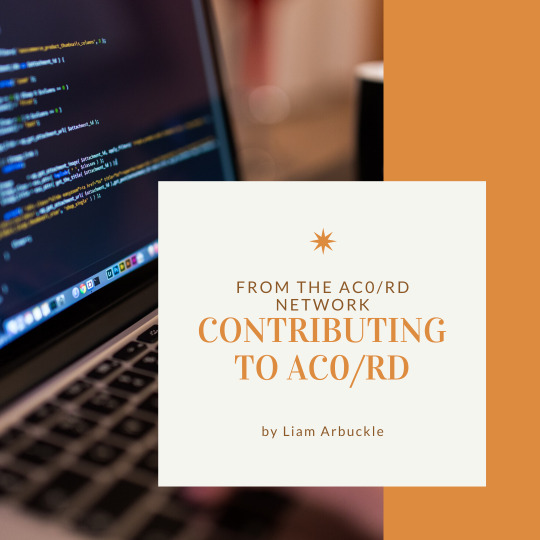
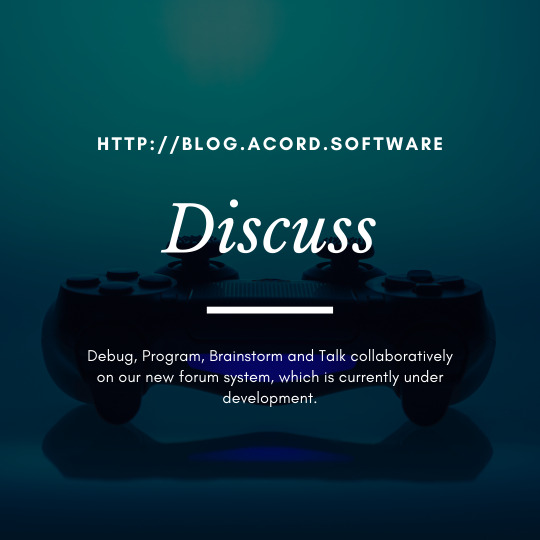
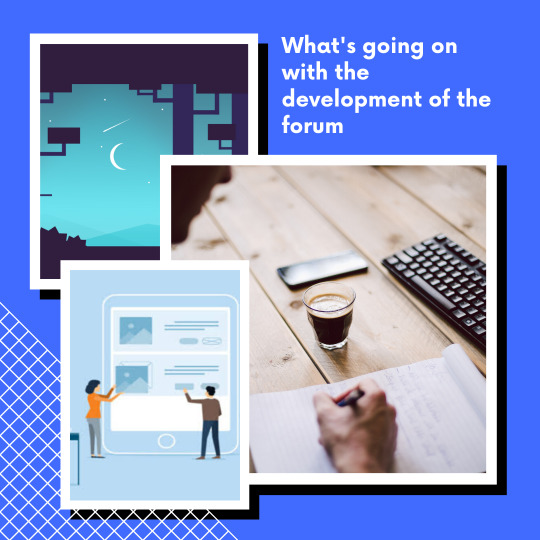
When doing projects with multiple people, collaboration is key. It’s how we get in contact with people who will work with us, but it’s also how we keep track of what’s going on. For example, the current project that I’m working on - the AWS JPL challenge - I’m working on with 3 other people, each with different roles and available software & hardware.
Since we all have different roles, unless we’re needing help with a specific job we can be pretty much left to our own devices most of the time while we’re developing the rl-agent. However, each job that we do depends on another job, which I’m not working on but I need it to be completed for me to be able to do my job.
Due to the complexity and vastness of the project, having unrecorded & unordered messages and phone calls simply won’t cut it. Neither will be using a piece of paper as a to-do list. Everyone needs to have access to everyone’s work.
Project Management
Project Management tools, also called CASE tools for system development/systems analysis, are incredibly important for any project. Popular examples, like Monday.com, Trello, & Zenhub are used by millions of groups around the world to track tasks, issues, pull/merge requests, etc. They’re incredibly useful for developers because they integrate well with version control software (aka Git), meaning that tasks only have to be ticked off once.
Issues created on github boards can automatically be added to these tools, and the same with pull requests; this reduces a significant amount of time when documenting and reporting on the project (and as we all know, documenting code is one of the most important parts of the project - right?).
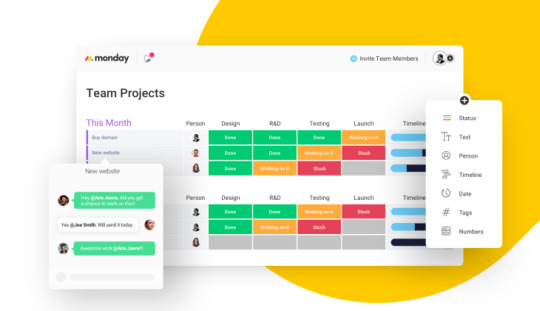
Image credit: http://techcrunch.com
Project management software can be used in conjunction with the other types of software, that I, and AC0/RD cannot live without.
Discussion & Collaborative Teamwork
Whenever I make a commitment to the challenge repo, I create a Thread on the repository explaining what I did and how I did it. Similarly, the other members of the team do the same. We create threads in Slack, boards on Trello and we tag each other in our commitments. The goal of this is to keep everyone on the same page as to what is going on, as well as to allow everyone to keep track of the latest changes & tasks so we know what to do for our own tasks.
A tool that I’ve found very useful for this purpose is Utteranc.es. What Utterances does is it allows you to embed github issues on the front-end of another website. It was designed for use by bloggers, where a github issue would be created for each new blog post on a site. Users can log into Github and then comment on blog posts. However, at AC0/RD we’re taking it to another level.
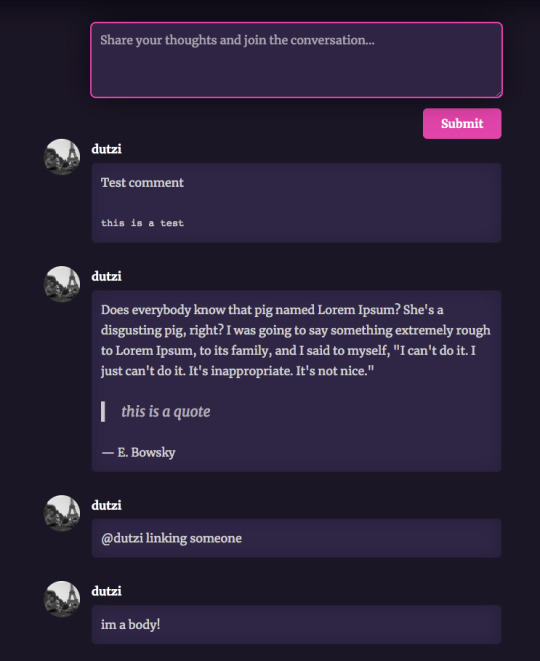
Image credit: http://utteranc.es
We use Disqus for blog comments, as well as JointComments (both are useful for documentation purposes, however, and on the “issue” pages on our network we also embed Disqus & JointComments). What we use Utterances for is to work collaboratively from the front end of the site. While right now it’s just on the Stellarios documentation site, when we get the Dashboard up and running we’ll be able to post, code, edit and collaborate from anywhere, on any device. Since Utterances uses Git, we can easily get the messages posted in Utterances to be sent into our Git repos. The great thing is that we’ll be able to use Utteranc.es anywhere, on any tool we use (definitely check out our post about Integrations on the Stellarios docs).
Liam Arbuckle <3
#writing#discussion#utterances#github#github pages#bootstrap#jekyll#hydejack#coding#community coding#collaborative coding#ac0rd#acord
2 notes
·
View notes
Video
youtube
FIFA 20 Manager Mode #2 | Roma vs Genoa | First match, first loss
0 notes
Video
youtube
FIFA 20 Manager Mode Episode 1 | AS Roma - Serie A | 2 Top Purchases!
0 notes
Text
AC0/RD Digest & our network ambitions
Something that’s been needed for a long time is a reliable network digest for our users and subscribers. I’ve used Wordpress.org for the longest time (almost 4 years, in fact) as the HQ for our community site, however I’ve started to use Git and static sites as the new skeleton for the AC0/RD Network. In today’s post, I’m going to talk about what happened to the old portal, why Github alone isn’t good enough for what we are doing, and also about what the actual title of the post suggests: our email subscription service.
Grab yourself a tasty beverage and snack, because this is going to be a slightly longer post than usual...
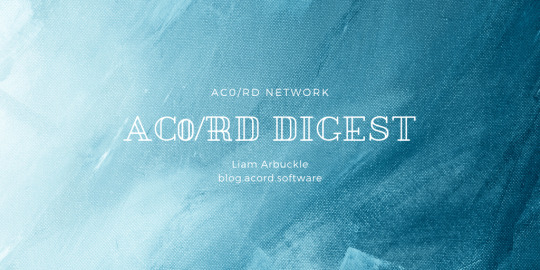
Rest in peace Portal #1 - 2016-20
Thanks to AC0RD’s first sponsor, Sean Firth, I got into the Wordpress.org community when I was only 13, and to this day I am still an everyday user of the popular CMS. I used Wordpress to create what was known as the “Portal” for AC0RD, which had the following features:
A blog
A database - for all the data collected by our bots & software
A forums & community section - where our members could talk about anything and everything, regardless of whether it was directly related to AC0RD or not, as well as the projects that we are/were working on
A media section (with groups & user profiles ^^)
Project management
Community growth
Over the years, I had about 10 members (Nicholas Antipas, Josh Richards, Sean, etc) contribute small bits of data and helpful stuff to the portal, but mostly it was a one-man-band. I was the singer, the guitarist, the drummer, and the roadie. Almost all of the forum posts I did myself, and the site was sort of like a large notebook, where only I contributed stuff to.
I told myself that this would only be temporary, and that it would be good for documentation (SDLC) purposes (to an extent, this is roughly the same situation now - except each post is being read by a few people, the repositories on Git & the new portal are getting edited by more people. It’s a start). But as the months stretched into years, I couldn’t help feeling disappointed about the lack of community growth. I’d thrown almost every bit of my spare time into this project, and it led to a lot of sleepless nights (not to mention every time I screwed up something on the site, like the dreaded white screen of death. I often joke that 99% of my PHP knowledge comes from reading those error messages).
This is why that when the first iteration (technically the second iteration, however the real original only lasted <72 hours before I broke it - in my defense I was VERY new to WP) bit the dust, after the initial shock, tears and screams I took a few deep breaths and decided that I would live with it.
The portal had become a wasteland, a barren wild wild west that only had 1 person as far as the eyes could see. Every now and again you’d see signs of a skeleton that still had some flesh, but those sights were rapidly being swallowed up by the growing chasm of self-doubt and despair that accumulated over my 3.5 years as the maintainer.
I talked about this to my mentor Nick, and we both agreed that maybe it was for the better. While I had recent backups of the old portal, maybe it was better for us to just make those backups open-source and create a fresh portal. This way, the documentation would still exist (it would just be less easy to navigate), but we’d have the advantage of a fresh start, and all in all a better springboard for leaping into the pool of software development. I set up a new installation of Wordpress with hostgator and that was that.
With the recent influx of members - Rishabh Chakrabanty, Basanta Kandel, Dylan Vekaria and so many others (thanks largely to the Facebook post we did on our page), we have a fledgling, but thriving, community on github, with projects being developed on git, discussed on slack & reddit, and shared on the website, with this being accumulated on the portal (for more information about this accumulation of data, I’d recommend checking out our post on dashboards: here: https://blog.acord.software/post/611809431430283264/html-dashboards-for-administration).
The old portal will live forever in my - and our - memories, and in our open-source database, but I look to the future, and this is the way it will be.
Why Github isn’t enough
Github is great for software development, especially collaborative open-source work. But when you want to build a community around your company (especially when a huge amount of your community won’t have, or want, github accounts), you need something else.
Wordpress is great, because with plugins like buddypress you can create social networks like Facebook on a smaller scale for your club/organisation (again, I’d recommend checking out another one of our posts about social network construction here: https://blog.acord.software/post/611414544827432960/constructing-a-social-network).
I’m a big sucker for integrations between our services (for a list of services that we use, check out this page on our Stellarios documentation: https://acord.software/stellarios/hydejack/2020-01-25-integrations/). Github is great, because you can connect your various online accounts to it with services like Zapier or Integromat. To get my dream network, we’re going to have to use services like those.
AC0/RD Members Digest
I’d hazard a guess that you’re part of a number of online communities. Wouldn’t it be great to have the latest notifications and news delivered daily, weekly or monthly for all those communities?
Buddypress (thanks to plugins available on wordpress.org) has had this kind of feature - email subscriptions - for a while. What I wanted when I started this project was a perfect amalgamation between our awesome online communities - Reddit, the Portal, Github, Facebook, etc. While we could implement some sort of system that would send an email from Facebook, an email from Reddit, etc, for the digest (so that you’d be burdened with 5 emails everytime you get a digest), I thought of something a bit different.
The ideal scenario would be to be able to link your Portal (wordpress) account with the online services/websites mentioned above ^^, and for the content that is relevant to your account (i.e. from your friends or groups) to be emailed to you, as well as site-wide notices. Unfortunately, the closest you can get to this at the moment is to share a link to your social media profiles on your Wordpress profile. Obviously, this won’t do.
Over the last 24 hours, I’ve been thinking: how do we create a network digest?
What we will be doing is we’ll create weekly posts on the new AC0/RD Portal, which will have the latest content from our online profiles. You’d then be able to sort through these, and as you’re logged into those accounts, be able to find what’s relevant to you easily. This post can then be sent to your email, and can work in with integrations like Gamipress.
Of course, we can also easily set up automatic post systems (for the forums WITHIN groups on the portal) that would then be sent into your newsfeed. Both of these solutions would work well, and we’ll be working on ways to implement them as best as we can very soon.
<3
Limo
1 note
·
View note
Text
HTML Dashboards for Administration
Dashboards are a very big project to undertake, but they’re also something very important to AC0/RD. In this post, I’ll talk about what dashboards are and how ours will work.

Contents
What are HTML Dashboards?
HTML Dashboards vs CMS Dashboards
What are HTML Dashboards
For developers coming from content management systems like Wordpress, Drupal & Joomla, the dashboard may sound like the “backend” of a website, and it commonly is, even with static site generators like Bootstrap. Bootstrap consists of a front-end, which is composed on html, css & javascript, and the individual files for that make up the site (which may be hosted on a service like Github).

In the case of a CMS, the dashboard allows you to track & manage things like:
Comments
Blog posts
User accounts
Site performance
Store sales
App performance
Survey results
& more…
On wordpress, the dashboard is all set up and ready to go as soon as you install wordpress on your server/host. With bootstrap, it’s a bit different.

“A dashboard usually consists of graphical representations of the current status and trends within an organization.
You can use your dashboard to monitor the same things that a CMS dashboard can, but you have to set it up manually. This can mean a lot of work, especially if you aren’t fluent with HTML, CSS & Javascript, but it can often work better. This is for a few reasons, which I’ll explain in a moment.
Driving a car requires you to see a control panel, that way you find out about your speed, mileage, how much gas you have left. You can consider having a software business the same way: you need to know how every part is behaving and when you need to take action.
HTML Dashboards vs CMS Dashboards
Let’s use wordpress as an example when we’re talking about dashboards built with a CMS.
For Wordpress, the dashboard is your hub, where by default everything gets done. Blog posts, surveys, email sign-ups and more are created, edited and deleted from the dashboard. In this case, the dashboard is less of a source of information and more of an administrative tool for your website.
However, when logging into a wordpress site, you (by default) get logged into the back-end - your dashboard (by default, it has the url yoursiteurl.com/wp-admin).


As you can see here, this part of the dashboard certainly looks more like an amalgamated set of information, reports, etc. In this example, the following is featured:
At A Glance –> A quick stats widget, showing the posts, pages and comments count for your website
Activity –> This widget shows the most recent blog posts published, and the most recent comments (it also shows comments that have been marked as “likely” spam)
Quick draft –> Draft a blog post here with this widget
Wordpress news –> Recent releases, news, etc
Certain plugins add more widgets to this screen, and you can add/remove them at your leisure by clicking the “screen options” button at the top right of the screen.
HTML Admin dashboards, on the other hand, are static. This is to say that while they do display information, which should update (for example, an RSS feed of your comments), the dashboard itself is static. The dashboard serves as the front-end of your Bootstrap website - with Wordpress, it’s the other way around.
Wordpress websites do not look like the dashboards shown above to visitors. They look like this:
This is because wordpress is composed of a front-end and a back-end of your site. The back-end is the administrative side, where only logged-in users can view it. This is how you create and manage content - we’ve already established this. For Bootstrap, while the dashboard can be set to log-in only, there is only one side, or part, of the site. The administrative work, and the viewing of the content gets done at the same time, on the same set of pages. You can actually set up a page on your wordpress (or CMS) site to display a dashboard like this:
However, the rules regarding front- and back-end still apply for sites built with CMS tools.
Originally published on the AC0/RD Blog.
#writing#coding#acord#html#dashboards#websites#web development#web dev#website development#bootstrap#wordpress#admin development
1 note
·
View note
Link
We’ve used an iFrame element to embed the blog onto our main site. As mentioned, this is just for testing purposes, and we want to here your thoughts. The jekyll site is available at http://acord-robotics.github.io/acord-robotics.github11 --> for testing purposes --> and we’ll continue to update both sites
2 notes
·
View notes
Text
I’m writing again!

Something that a lot of my readers and friends (by writing this, I hope to turn a few of my friends into readers, as well) will know about me is that I’m a very unusual person. I had a 1% chance of being born this way, and if my conception had occurred just a second later, a different sperm would have fertilized the egg and I wouldn’t be here, with all my flaws and eccentricities. But I’m here today, and hopefully for the next few decades as well, so I might as well write about what this is.
I have autism spectrum disorder. More specifically, I have what was once known as Asperger’s Syndrome (and, I wholeheartedly agree with South Park that naming a social development disorder “Ass Burgers” was just mean).

I’m not going to go into the details of my disorder, for the simple reason that we don’t have time. What I will do, is talk about my newest novel that I’m writing. If you do want to know more about ASD, I’d recommend checking out the “Further Reading” section at the bottom of this post.
Ever since Star Sailors wrapped up production, I’ve been kicking around ideas for my next novel. I was am part of the Fremantle Young Writers group at Fremantle Literature Center, and during the last meet-up of 2019 I was paired with a girl I didn’t know, from another school, who wrote romance novels. Definitely not my style. The activity that we had to do was to adapt an extract of a project we were working on to use the style/genre of writing that our partner used. At the time, I was still working on Star Sailors (until work on the Manacaster beta wraps up, the full Earthlings novella won’t be released to the public to reduce spoilers concerning the game, however the development team & the <AC0/RD> members have full access to the project. It’s free to sign up at our website) and work was just about to finish up on the final draft.
Over the next few months, like I said I had been kicking the ideas around inside my head, until I came up with an idea about doing a romance novel. She’s rubbed off on me!
The novel I’m writing, Interdit D’Aimer, is a romance novel (disgusting!) about an individual with ASD. I won’t say too much more for now, but more will be posted here over the coming weeks.
Limo
Further Reading
https://www.autismspeaks.org/what-autism
Interdit D'Aimer is not dead - after 2 months contemplating its future, I've decided to continue it. The first month of year 12 is over, and with that comes the school ball, so why not continue writing my romance novel on @Wattpad? Link will be posted shortly pic.twitter.com/lt3Nof1qdJ
— Liam Arbuckle (@OpusTheRobot) February 28, 2020
0 notes
